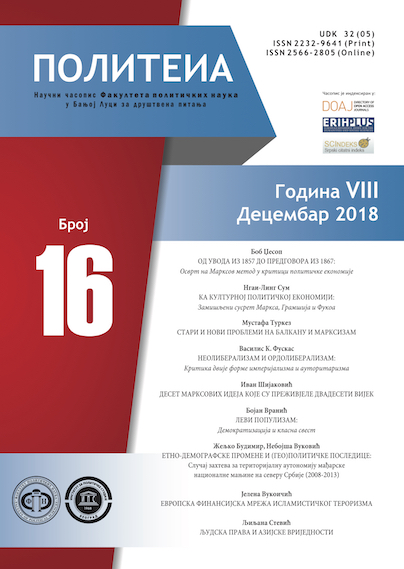OLD AND NEW PROBLEMS IN THE BALKANS AND MARXISM
Abstract
Efforts to determine the place of Marxism in the Balkans in a historical manner seem to enable us to outline not only the historical importance of Marxism but also to point out more precisely its relevance with contemporary problems and possible solutions in the Balkans. In order to outline very briefly the place of Marxism in the Balkans, this paper first seeks to discuss the old (late 19th, early 20th) and new (late 20th, early 21st century) common problems people in the Balkans encountered with a view to underlining the continuity of the problems. Second, it illustrates the way in which the old and new problems had been addressed. I assume that capitalism keeps failing to find a workable solution to any major problem people in the Balkans faced, but constantly transforms the problems with which it overcomes its own survival. Third the paper examines achievements and shortcomings of first and second generation of socialists in the Balkans. Finally, the paper puts forward that it is up to the third generation of Marxist-inspired thinkers to propose an alternative system inspired from Marxism(s) as opposed to the capitalist system that kept failing to address the problem, but transforms the problem itself rather than solving any.
References
Anderson, K. B. (2012). Marx at the Margins, On Nationalism, Ethnicity and Non-Western Societies. Chicago and London:.The University of Chicago Press.
Christopher G. A. Bryant, C., Mokrzycki, E. (1994). The New Great Transition. LondoN: Routledge
Daskalov, R., Mishkova, D. (Ed) (2014). Entangled Histories of the Balkans, Transfers of Political Ideologies and Institutions, 2, Leiden and Boston: Brill.
Engels, F. (1979). The Turkish Question, in Marx and Engels Collected Works, 12, Moscow: Progress Publishers: 22-27.
Eurostat Database, https://ec.europa.eu/eurostat/data/database
Holmes, L. (1997). Post-Communism, Durham: Duke University Press.
Holmes, L. (1997). The Democratic State or State Democracy? Problems of Post-Communist Transition. Jean Monnet Chair Paper RSC NO 97(48), Florence: European University Institute.
Horvat, S., Štiks, I. (2015). Welcome to the Desert of post-Socialism: Radical Politics after Yugoslavia, London: Verso Books.
Huntington, S. P. (1993). The Clash of Civilizations. Foreign Affairs: Summer.
Jelavich, B. (1986, 1987). History of the Balkans, Volume 1 and 2, Cambridge: Cambridge University Press.
Journal of Democracy; https://www.journalofdemocracy.org/
Kaplan, R. (1993). Balkan Ghosts: A Journey Through History. New York: St. Martin's Press.
Kojanic, O. (2015). Nostalgia as a practice of the self in post-socialist Serbia. Canadian Slavonic Papers, 57(3-4): 195-212.
Lapchevich, S. M. (2015). A Brief History of Serbian Socialism, Part I, translated by Drashkovic, N. and ed. by Flores, J. https://syncreticstudies.com/2015/08/25/a-brief-history-of-serbian-socialism-part-i/
Lavigne, M. (2000). Ten Years of Transition: A Review Article. Communist and Post-Communist Studies.
Meriage, L. P. (1978). The First Serbian Uprising (1804-1813) and the Nineteenth-Century Origins of the Eastern Question, Slavic Review, 37(3): 421-439.
Schopflin, G. (1993). Politics in Eastern Europe, Oxford: Blackwell.
Türkeş, M. (1993). Ideological Tendencies in the Republic of Turkey: the Case of Kadro. Ph.D. Thesis. Manchester: University of Manchester.
Türkeş, M. (1994). The Balkan Pact and Its Immediate Implications for the Balkan States. Middle Eastern Studies, 30(1): 123-144.
Türkeş, M. (2004). The Double Process: Transition and Integration and Its Impact on the Balkans in Towards Non-violence and Dialogue Culture in Southeast Europe, ed. by Mitev, P.E., Riordan, J. Sofia: Iztok-Zapad Publishing House, 13-28.
Wachtel, A. B. (2008). The Balkans in World History. Oxford New York: Oxford University Press.
Autori koji objavljuju u ovom časopisu pristaju na sljedeće uslove:
- Autori zadržavaju autorska prava i pružaju časopisu pravo prvog objavljivanja rada i licenciraju ga "Creative Commons Attribution licencom" koja omogućava drugima da dijele rad, uz uslov navođenja autorstva i izvornog objavljivanja u ovom časopisu.
- Autori mogu izraditi zasebne, ugovorne aranžmane za neekskluzivnu distribuciju članka objavljenog u časopisu (npr. postavljanje u institucionalni repozitorijum ili objavljivanje u knjizi), uz navođenje da je članak izvorno objavljen u ovom časopisu.
- Autorima je dozvoljeno i podstiču se da postave objavljeni članak onlajn (npr. u institucionalni repozitorijum ili na svoju internet stranicu) prije ili tokom postupka prijave rukopisa, s obzirom da takav postupak može voditi produktivnoj razmjeni ideja i ranijoj i većoj citiranosti objavljenog članka (Vidi Efekti otvorenog pristupa).

